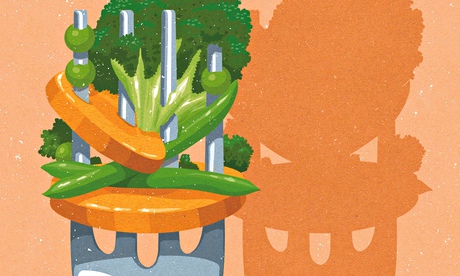
Parents of three-year-olds, I imagine, won't be hugely surprised by new research describing what happens when you give them carrots, or other unexciting foods, then tell them they should eat what's on the plate because it's good for them: they don't. Partly, no doubt, that's because doing the opposite of what you're told is a key clause in the International Declaration of Toddlers' Rights, signed at a global convocation of kindergarteners at Mr Tumble's house in 1948. But the study, published in the Journal of Consumer Research, points to another, subtler explanation. Its sample was quite small – in both senses. But it suggests that three- to five-year-olds apply a simple rule: if a food is good for one goal (such as long-term health), it must be less good for another goal (a delicious taste experience). When told food would make them stronger, or better at counting or reading, children came to think of it as less tasty, and ate a smaller amount.
Most of us grow out of the need to be contrarian for the sake of it, with the possible exception of one or two Daily Telegraph commentators. But this subtler idea – that if something's well suited to an "instrumental" goal such as health, it must be worse for an "experiential" goal such as tastiness – accompanies us beyond toddlerhood: we assume that what's good for us can't also be much fun. Labelling foods as healthy, it's been shown, puts older children off them. Even among adults, emphasising the instrumental benefits of activities such as running or yoga seems to reduce enjoyment. This "broccoli logic" – which is what I'm calling it, even though broccoli wasn't involved, because it sounds better – transforms potential pleasures into tedious duties. The more usefulness, the less joy, whether it's carrots or cardio.
And these days, unfortunately, instrumentality is king. We're forever being told to get more sleep, meditate more, spend more time in nature. Excellent advice – except the reasons given are almost always instrumental: not inherent pleasure, but so you'll become more productive at work. Arianna Huffington's recent book Thrive "isn't so much about forgoing money and power in order to find health and happiness as it is calibrating your health and happiness to help you secure more power and accumulate more wealth," Amanda Hess argued recently in Slate. "[Not] challenging the capitalist system that's worked you to the bone, but rather learning how to be a more holistically integrated cog in the machine." As Alan Watts put it: "To play so as to be relaxed and refreshed for work is not to play."
Or take the new meditation book by the hip-hop mogul Russell Simmons entitled, almost as if parodically, Success Through Stillness. The problem isn't that meditation can't lead to billionairehood. Rather, it's that trying to be present in the moment isn't going to work if you're fixated on potential future benefits. Too much focus on instrumentality doesn't just sap carrots of their tastiness: it risks turning the whole of life into an exercise in missing the point, preparing for a future that never arrives.
By the way, the best way to get small children to eat veg, the researchers conclude, is "simply serving the food, without giving any message about the goal eating it might serve". Unbothered by goals, they're free to enjoy eating. Unless it's watercress, obviously. That's just disgusting.
oliver.burkeman@theguardian.com
Follow Oliver on Twitter

